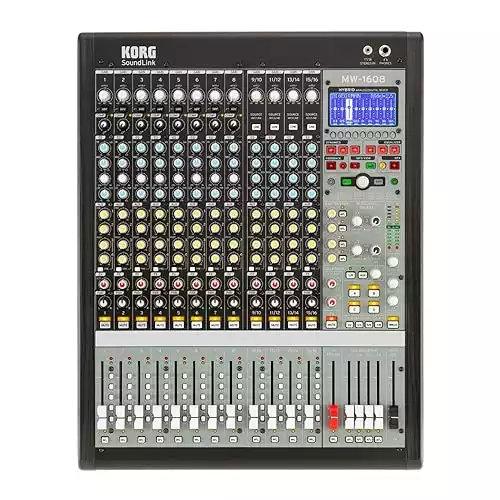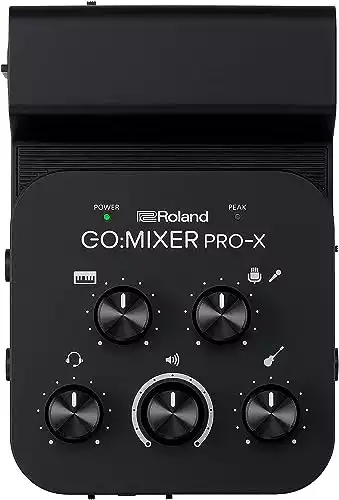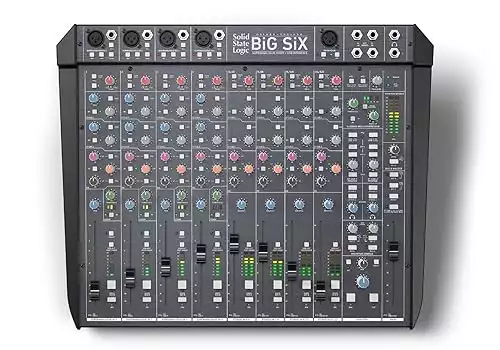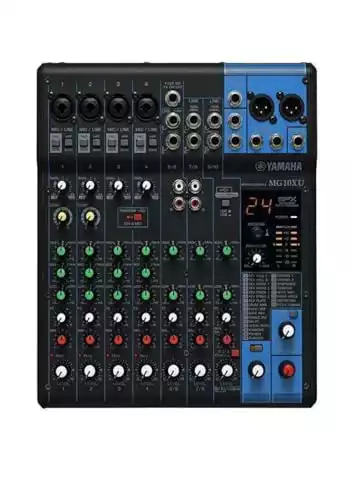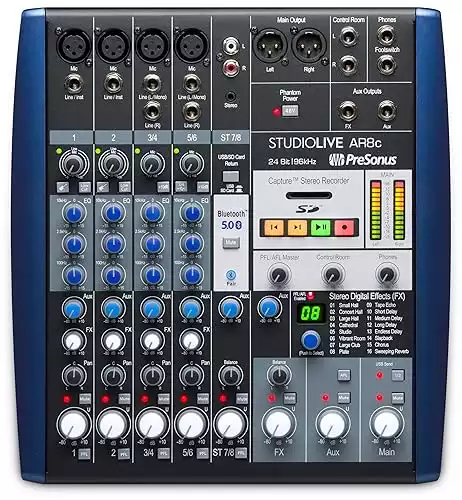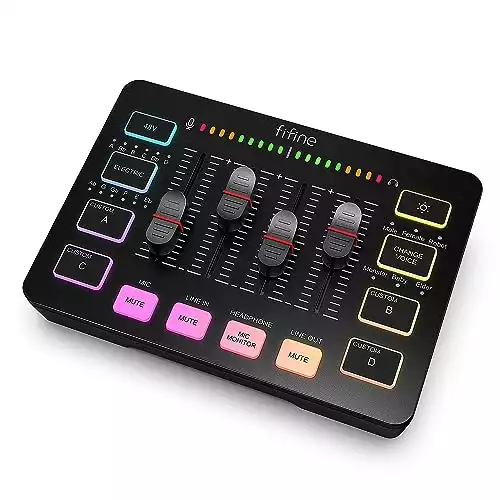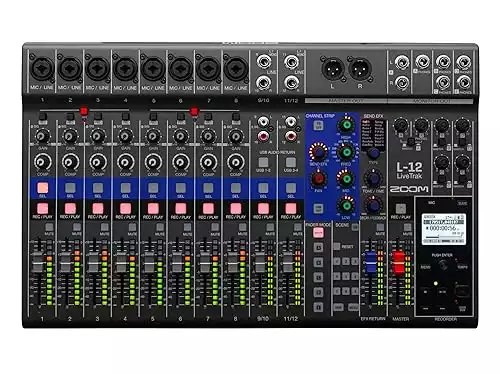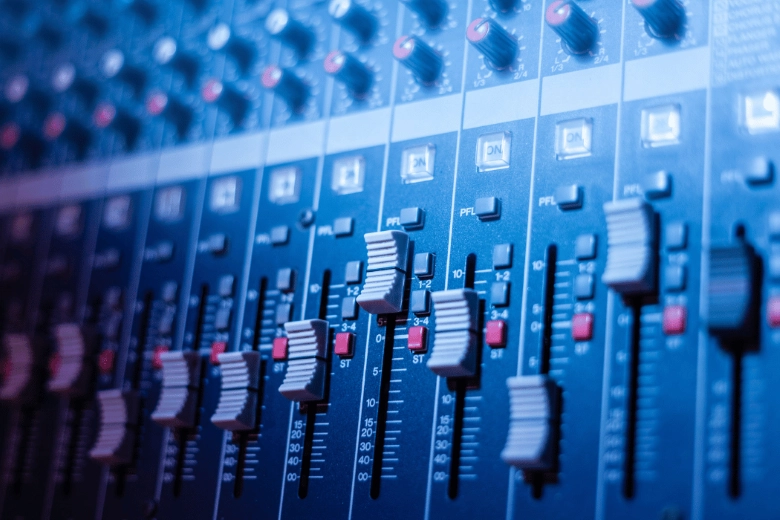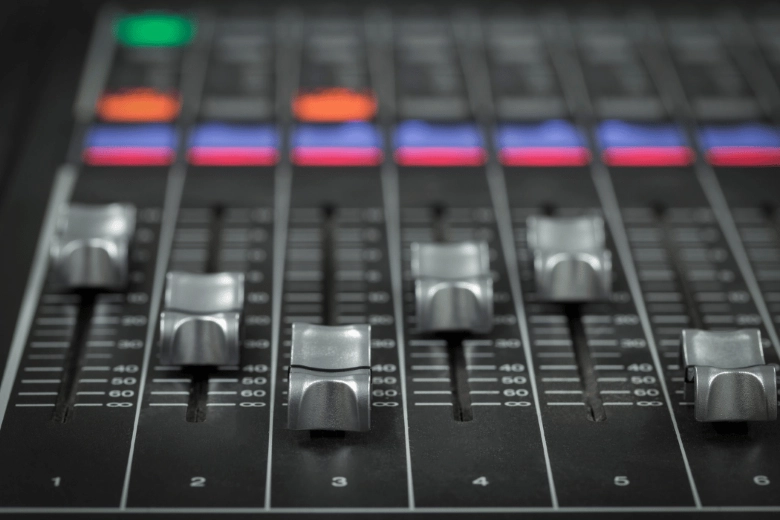Choosing the right audio mixer can make a significant difference in the quality of your recordings and live sound. Whether you're a musician, podcaster, or content creator, understanding what each mixer has to offer is crucial to making an informed decision. In this guide, we’ll dive into the top audio mixers on the market, providing a comprehensive review of each one. Here’s what you’ll learn:
- Key Features and Benefits: We’ll break down the essential features of each mixer, such as connectivity options, sound quality, and special effects, helping you identify which mixer best suits your needs.
- Pros and Cons: Gain insights into the strengths and weaknesses of each mixer to understand how they perform in various settings, from live performances to studio recordings.
- Ideal Use Cases: Discover which sound mixers are best for specific applications, whether you’re looking for a portable solution, a high-end studio mixer, or something versatile for multiple uses.
What Are The Best Audio Mixers?
The best sound mixers blend innovative technology with a user-friendly design to cater to a variety of audio needs. From compact, portable models ideal for mobile content creation to advanced digital mixers with extensive recording capabilities, there’s a perfect mixer for every situation. Our list highlights the top contenders in this space, ensuring you can find the right mixer to elevate your sound quality and streamline your audio workflow.
Here are the top audio mixers to consider:
- Roland Go Pro X
- Korg SoundLink MW-1608
- SSL BiG SiX
- YAMAHA MG10XU
- PreSonus StudioLive AR8c
- FIFINE Sound Mixer
- Zoom LiveTrak L-12
1. Roland Go Pro X
Why Someone Should Buy:
Ideal for musicians and content creators who prioritize portability without compromising on audio quality.
Technical Features:
- Inputs: 1 x XLR-1/4" combo (mic), 2 x 1/4" TRS, 2 x 1/8" TRRS (line in), 1 x 1/8" TRRS (smartphone in/out)
- Outputs: 1 x 1/8" headphones, USB Micro-B
- Power Source: 4 x AAA batteries / USB bus powered
Review:
The Roland Go Pro X excels in providing a seamless audio mixing experience for smartphone users and mobile content creators. Its intuitive design and robust build quality make it a standout choice for those needing a reliable mobile mixing solution.
Verdict:
For musicians and creators who demand portability and versatility without sacrificing audio fidelity, the Roland Go Pro X is an excellent choice.
This Mixer is Perfect For:
- Musicians on the go
- Content creators filming with smartphones
Know what you are boosting - If you are mixing live sound, you need to be aware of everything that's going on and everything that your decisions might impact. Microphones on stage pick up lots of background noise, things like drum cymbals and so on. Boosting the high-end might bring forward a lot of unwanted noise.

2. Korg SoundLink MW-1608
The Korg SoundLink MW-1608 offers a hybrid design that combines the warmth of analog sound with modern digital features. It boasts high-quality mic preamps, versatile connectivity options, and integrated Korg digital effects, making it suitable for both studio and live applications.
- HiVolt mic preamps and Velvet Sound AD/DA converters ensure exceptional audio fidelity.
- Streamlined per-channel EQ and compressors simplify the mixing process.
- Integrated Korg digital effects enhance creativity and performance.
Why Someone Should Buy:
Perfect for musicians and audio engineers looking for a versatile mixer that delivers pristine sound quality and intuitive control.
Technical Features:
- Channels: 16 inputs (12 x XLR, 8 x 1/4" TRS)
- Outputs: 2 x XLR, 2 x 1/4" (main), 2 x 1/4" (monitor)
- Effects: 20 x Korg 32-bit digital FX, 10 simultaneous recallable parameters
- Computer Connectivity: USB (stereo)
Review:
The Korg SoundLink MW-1608 impresses with its hybrid design, combining analog warmth with digital precision. It's equipped with robust features like advanced EQ, built-in effects, and a user-friendly interface, making it a standout choice for both studio recording and live sound applications.
Verdict:
If you're seeking a mixer that marries a classic analog feel with modern digital flexibility, the Korg SoundLink MW-1608 delivers exceptional performance and versatility.
This Mixer is Perfect For:
- Studio recording
- Live sound reinforcement
3. SSL BiG SiX
The SSL BiG SiX is a premium analog mixer renowned for its sonic quality and intuitive workflow. Ideal for professional studios and serious home setups, it features high-quality mic preamps, comprehensive connectivity, and integrated SSL effects for pristine audio processing.
- SSL Vocalstrip 2 and Drumstrip processing add studio-grade polish to recordings.
- Extensive connectivity options, including USB interface for seamless integration.
- Includes a generous software bundle with essential production tools.
Why Someone Should Buy:
For those who demand top-tier audio performance and industry-standard features in their recording and mixing setup.
Technical Features:
- Channels: 18 inputs (4 x XLR mic preamps, 8 x 1/4" TRS)
- Outputs: 2 x 1/4" TRS (main), 2 x 1/4" TRS (monitor), 2 x 1/4" TRS (alt monitor)
- Effects: SSL Vocalstrip 2, Drumstrip, 31-band spectrum analyzer
- Computer Connectivity: USB (16 x 16)
Review:
The SSL BiG SiX stands out as a professional-grade analog mixer with exceptional sound quality and extensive features. It combines classic SSL analog circuitry with modern digital enhancements, making it a preferred choice for audio professionals and serious enthusiasts alike.
Verdict:
If you're serious about audio fidelity and require a mixer that excels in both performance and versatility, the SSL BiG SiX is an investment that delivers unparalleled sonic results.
Are you an audio professional looking for the best equipment? Check out the best Macbooks for music production and the best ribbon mics.
This Mixer is Perfect For:
- Professional studios
- Audio engineers and producers
Know your vocalist - Every singer is different, and every project is different, but you can apply some general guidelines to male and female vocals. The real substance of male vocals is between 100-300 Hz and around 200-400 Hz for females. Make sure you let those ranges cut through in your mix to get a fuller sound.

4. YAMAHA MG10XU
The Yamaha MG10XU is a compact mixer that packs professional-grade features into a small, sturdy unit. Ideal for both live sound and recording applications, it offers high-quality mic preamps, onboard effects, and straightforward USB connectivity.
- D-PRE mic preamps deliver exceptional sound clarity.
- 24 built-in SPX effects for versatile sound design.
- Durable metal chassis designed for longevity onstage.
Why Someone Should Buy:
Great for those needing a versatile and compact mixer with high-quality sound and built-in effects, perfect for both live and studio settings.
Technical Features:
- Channels: 10
- Inputs: 4 x XLR combo, 6 x TRS, 4 x RCA
- Outputs: 2 x XLR, 2 x TRS (main), 2 x TRS (monitor)
- USB Connectivity: USB 2 x 2
- Effects: 24 SPX effects
Review:
The Yamaha MG10XU impresses with its clean and transparent sound quality, thanks to the D-PRE mic preamps. The addition of 24 onboard SPX effects and easy USB connectivity makes it a versatile choice for various audio applications, whether you're in the studio or on stage.
Verdict:
If you're looking for a compact, reliable mixer with high-quality preamps and built-in effects, the Yamaha MG10XU is an excellent option that delivers both functionality and durability.
This Mixer is Perfect For:
- Live sound applications
- Home studio setups
5. PreSonus StudioLive AR8c
The PreSonus StudioLive AR8c is a versatile mixer that doubles as a USB audio interface, making it ideal for small venues, podcasting, and home studios. It features a variety of input options, built-in effects, and Bluetooth connectivity for streaming.
- Dual functionality as an analog option and USB audio interface.
- Bluetooth connectivity for easy streaming from smart devices.
- Includes Studio Magic Plug-in Suite for enhanced production capabilities.
Why Someone Should Buy:
Perfect for musicians and podcasters who need a flexible mixer with USB recording capabilities and built-in effects, combined with modern connectivity options.
Technical Features:
- Channels: 8
- Inputs: 4 x XLR, 4 x 1/4" TRS, 1 x Dual RCA, 1 x 1/8" (stereo)
- Outputs: 2 x XLR (main), 2 x 1/4" TRS (control room)
- USB Connectivity: USB-C 2.0 (8 x 4)
- Bluetooth: v5.0
Review:
The PreSonus StudioLive AR8c stands out with its combination of analog mixing and digital recording features. Its Bluetooth connectivity, audio interface, and versatile input options make it a strong choice for a wide range of audio tasks, from live performances to recording and podcasting.
Verdict:
For those seeking a multifunctional mixer that seamlessly integrates with both analog and digital workflows, the PreSonus StudioLive AR8c offers a solid blend of performance and flexibility.
This Mixer is Perfect For:
- Small venue performances
- Home recording and podcasting
6. FIFINE Sound Mixer
Why Someone Should Buy:
Ideal for those starting in streaming or podcasting who need a budget-friendly mixer with essential features for high-quality audio.
Technical Features:
- Inputs: XLR mic input, 2 x Line in
- Outputs: Headphones, Line out
- Features: 48V phantom power, 6 voice changing modes, real-time monitoring
- Compatibility: Plug 'n play with Mac OS/Windows
Review:
The FIFINE Sound Mixer offers a great entry point for those new to audio mixing. It provides essential features like phantom power and real-time monitoring at an affordable price, making it suitable for budding streamers and podcasters.
Verdict:
For beginners looking for an affordable and straightforward mixer with basic features for streaming and podcasting, the FIFINE Sound Mixer is a solid choice that delivers good value for its price.
This Mixer is Perfect For:
- Budget-conscious streamers
- Entry-level podcasters
7. Zoom LiveTrak L-12
The Zoom LiveTrak L-12 is a sophisticated digital mixer that also functions as a 12-track recorder. It provides comprehensive features for both live and studio use, including multi-track recording, customizable headphone mixes, and extensive connectivity options.
- 12-track recording to SD card with simultaneous playback to computer.
- Customizable headphone mixes for up to 5 band members.
- Extensive connectivity options including USB and SD card recording.
Why Someone Should Buy:
Ideal for those needing a versatile mixer with advanced recording capabilities and customizable monitoring options, perfect for live performances and studio work.
Technical Features:
- Channels: 12 (8 mono, 2 stereo)
- Inputs: 8 x XLR-1/4" combo, 2 x Hi-Z
- Outputs: 2 x XLR (master), 2 x 1/4" (monitor)
- USB Connectivity: 14 x 4
- Recording: 12-track, 24-bit/96kHz to SD card
Review:
The Zoom LiveTrak L-12 excels in delivering a comprehensive solution for live and studio applications. Its ability to record up to 12 tracks simultaneously and provide customizable mixes makes it a powerful tool for professional and semi-professional use.
Verdict:
For those needing a feature-rich digital mixer with advanced recording and monitoring capabilities, the Zoom LiveTrak L-12 offers exceptional versatility and reliable performance.
This Mixer is Perfect For:
- Live performance recording
- Multi-track studio recording
Buyer's Guide: Choosing the Right Audio Mixer
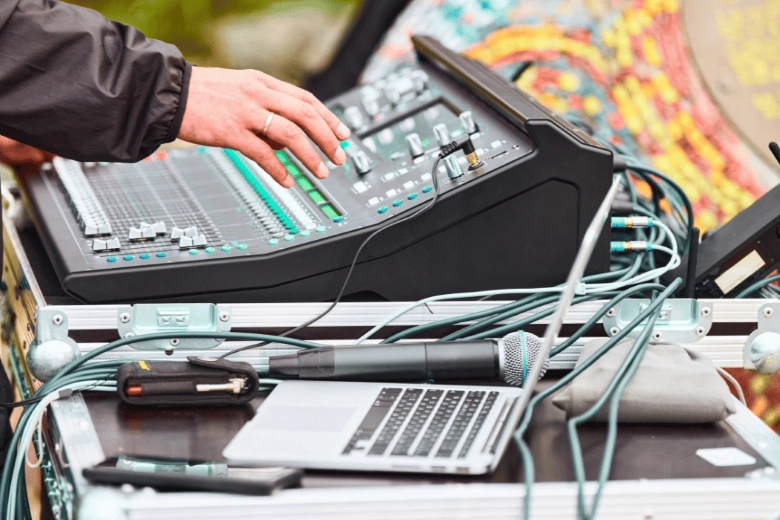
When selecting a sound mixer, it's crucial to understand the intricacies of what different models offer and how they fit into your overall audio setup. Whether you’re managing recording sessions, live performances, or sound projects, the right mixer can make all the difference. Here’s a guide to help audio enthusiasts make an informed choice.
What are Audio Mixers For?
Audio or sound mixers are designed to manage and enhance multiple audio signals from various sources, playing a crucial role in both live environments and studio recordings. It combines signals from microphones, instruments, and playback devices into a unified output while offering individual control over volume, equalization, and effects for each channel. This allows for shaping and enhancing the sound, addressing issues like feedback or muddiness, and applying effects such as reverb and delay.
Additionally, sound mixers handle routing to main outputs and monitor mixes, providing clear sound for both audiences and performers. In recording scenarios, they facilitate detailed mixing, ensuring high-quality sound production. Whether for live performances, studio work, or broadcasting, a mixer ensures that all elements of the audio setup are balanced and optimized.
Understanding the Purpose of the Mixer
Live Performances: For live performances, consider purchasing a mixer with robust control room outputs, multiple input channels, and reliable effects processing. The ability to handle multiple audio sources simultaneously and manage real-time adjustments is crucial.
Recording Sessions: For music production and studio recording, focus on sound mixers that offer high-quality preamps, multitrack sound recording capabilities, and seamless integration with DAW software. Features like direct monitoring and advanced EQ controls are important for achieving a professional stereo mix.
Content Creation: If you’re creating content, especially for streaming or podcasting, a portable mixer with USB connectivity and built-in effects can enhance your audio projects and simplify your workflow.
Looking for the best mic for content creation? Check out this article.
Key Features to Consider
Input Channels and Connectivity
Channels: Evaluate the number of input channels to ensure the mixer can handle all your audio sources. More channels provide greater flexibility for mixing multiple sources, whether it's microphones, instruments, or other audio devices.
Inputs and Outputs: Check for a variety of input options, including XLR, 1/4" TRS, and RCA. Outputs should include options for powered speakers and control room outputs. This flexibility allows for integration with various audio equipment and scenarios.
Mic Preamps: High-quality mic preamps are essential for capturing clear and detailed audio. Look for sound mixers with reputable preamp designs that provide clean gain and low noise levels, which is crucial for both live mixing and studio applications.
Built-in Effects and Processing: Many sound mixers come with built-in effects such as reverb, delay, and EQ. These can be particularly useful for enhancing live performances or adding polish to your recordings. Ensure the effects suite meets your needs for both real-time adjustments and post-processing.
Multitrack Recording Capabilities: For complex audio projects, a mixer with multitrack recording capabilities allows for capturing individual tracks separately. This is essential for detailed editing and mixing in DAW. Look for mixers that offer direct-to-USB recording or integration with external recording devices.
Integration with Other Equipment
DAW Software Compatibility: Ensure the mixer integrates smoothly with your DAW. This allows for efficient transfer of recorded tracks, precise editing, and easier control over the mixing process. Some sound mixers offer dedicated drivers or control surfaces for enhanced compatibility.
Connection with Powered Speakers: The mixer should provide suitable outputs for connecting to powered speakers. This includes main outputs, monitor outputs, and auxiliary sends. Proper output connections ensure clear and balanced sound reproduction across different playback systems.
Portability and Durability
Build Quality and Construction: Look for mixers with durable construction, especially if you’ll be transporting them frequently. Metal chassis and sturdy knobs are indicators of a well-built mixer that can withstand the rigors of live performances or frequent use.
Size and Weight: Depending on your setup, the size and weight of the mixer may be a significant factor. Portable mixers are ideal for on-the-go audio setups, while larger mixers with more features might be better suited for stationary use in a control room.
User Interface and Control
Ease of Use: Consider the user interface of the sound mixer. Intuitive controls, clear labeling, and easy access to key functions enhance usability and speed up the mixing process, whether you’re adjusting levels during a live show or fine-tuning your projects in the studio.
Automation and Scene Management: Advanced mixers offer automation features and the ability to save and recall scenes. This is particularly useful for live performances, allowing you to quickly switch between different setups or recall specific settings for various segments of a show.
Budget and Value
Cost vs. Features: Determine your budget and compare it against the features offered by different mixers. While higher-end models may offer more advanced features, there are often cost-effective options that provide excellent performance for specific needs.
Long-term Value: Consider the long-term value of your investment. A higher initial cost might be justified if the sound mixer offers longevity, flexibility, and compatibility with future audio technologies.
The Difference Between Digital and Analog Audio Mixers
When selecting a mixer, one of the key decisions is choosing between digital and analog models. Both types offer unique advantages and functionalities, and understanding their differences can help you make an informed choice based on your specific needs and preferences.
Analog Mixers
Analog mixers operate using traditional, hardware-based circuitry to process signals. Here are some key characteristics:
- Signal Path: In an analog mixer, sound signals are routed through physical circuitry, including preamps, EQs, and faders. Each control alters the signal in a tangible, physical way.
- Sound: These mixers are often praised for their warm, natural sound. Many audio enthusiasts appreciate the subtle harmonic distortions that analog components can introduce, which can add character to the audio.
- User Interface: They feature tactile, physical controls such as knobs and faders, which some users find intuitive and straightforward. The physical nature of these controls allows for real-time adjustments without the need for a screen.
- Simplicity: These mixers are generally simpler in terms of interface and operation. They are often favored for their reliability and ease of use, with fewer software-related issues compared to digital mixers.
- Maintenance: Analog options require more maintenance, as they involve physical components that can wear out over time. However, they are often easier to repair and modify due to their straightforward design.
Digital Mixers
Digital mixers use digital processing to manage and modify audio signals. Here are some distinguishing features:
- Signal Path: Digital options process audio signals and convert them into digital data, which is then processed by software algorithms. This allows for a wide range of processing options, including advanced effects, automation, and recallable settings.
- Sound: A digital mixer can offer extremely precise and clean audio processing. While they might lack the "warmth" associated with analog options, they excel in delivering clarity and detail. High-quality digital converters can ensure that sound remains accurate and transparent.
- User Interface: Digital mixers often feature screens and digital controls, which can display complex parameters and settings. This interface allows for extensive customization and control over audio processing but may have a steeper learning curve.
- Features and Flexibility: Digital mixers provide a plethora of features, such as built-in effects, automation, and the ability to save and recall mix settings. They are highly flexible, offering extensive options for routing, processing, and integration with digital audio workstations (DAWs).
- Maintenance: These type of mixers generally require less physical maintenance compared to their analog counterparts, as they have fewer moving parts. However, they may require software updates and troubleshooting of digital systems.
Choosing Between Digital and Analog Mixers
The choice between digital and analog mixers depends on your specific needs, preferences, and budget. Analog mixers are ideal for those who prefer a straightforward, tactile approach with a traditional sound character. They are often favored in live settings where reliability and ease of use are paramount.
On the other hand, digital mixers offer advanced features, flexibility, and precise control, making them well-suited for studio environments and complex live audio setups. They are beneficial for users who require extensive processing options and the ability to save and recall settings.
Ultimately, both digital and analog mixers have their own strengths and can be used effectively depending on the context and goals of your projects.
Frequently Asked Questions
What is the best mixer for audio?
The best mixer for audio depends on your specific needs and application. For example:
- Roland GoPro X is excellent for mobile content creators due to its compact size and versatility.
- SSL BiG SiX stands out for its high-end analog sound and extensive feature set, making it ideal for professional studio environments.
- Zoom LiveTrak L-12 offers advanced digital mixing and multi-track recording capabilities, which is perfect for live performances and recording.
Does an audio mixer increase sound quality?
A mixer itself does not inherently increase sound quality, but it can enhance it by providing precise control over various audio parameters. Features such as high-quality preamps, EQ settings, and effects can significantly improve the overall sound by allowing you to shape and balance signals to achieve a clearer and more professional sound.
How do I pick a good audio mixer?
To pick a good mixer, consider the following factors:
- Purpose and Application: Identify whether you need a mixer for live performances, recording, or content creation. Different mixers are designed with specific uses in mind.
- Features and Connectivity: Evaluate the mixer's inputs, outputs, and connectivity options (e.g., USB, Bluetooth). Ensure it has the necessary features such as phantom power, EQ controls, and built-in effects.
- Portability and Size: If you need a mixer on the go, a compact and portable option might be best. For stationary setups, a larger mixer with more channels and features may be more suitable.
Are audio mixers worth it?
Audio mixers are worth the investment for anyone serious about audio production, whether for live performances, recording, or broadcasting. Their value lies in their ability to manage, shape, and enhance multiple signals, which is essential for achieving high-quality sound.
In live sound environments, mixers play a crucial role in balancing audio levels, controlling feedback, and applying effects in real time. They allow for precise control over each audio source, ensuring that every element of the performance is heard clearly and distinctly. This capability is particularly valuable in complex setups where multiple microphones, instruments, and playback devices are used. Without a mixer, achieving a coherent and well-balanced sound would be challenging.
For recording in the studio, mixers offer substantial benefits in terms of flexibility and sound. They enable multitrack recording, which allows for capturing individual audio sources on separate tracks. This is essential for detailed mixing and mastering, where each track can be adjusted independently to create a polished final product. Mixers also provide high-quality preamps and effects processing, contributing to the overall fidelity and richness of the recorded sound.
In broadcasting and content creation, mixers facilitate seamless integration of various audio sources, such as microphones and playback devices, into a cohesive broadcast. They also offer real-time monitoring and adjustments, ensuring that the final output meets the desired standards.
Overall, the benefits of a mixer include enhanced control over audio levels, improved sound, and greater flexibility in managing and processing sound signals. While mixers represent a significant investment, their contribution to achieving professional-grade sound and streamlining the production process makes them a valuable tool for anyone involved in audio work.
Final Thoughts
Choosing the right mixer is a pivotal decision for achieving high-quality sound in both live performances and studio recordings. With the myriad of options available, understanding your specific needs and evaluating key features—such as channel count, built-in effects, audio quality, and connectivity—will guide you toward the best choice. Whether you’re an audio enthusiast seeking to elevate your recording sessions, a live sound engineer looking to enhance control room outputs, or a content creator needing a reliable mixer for diverse audio projects, selecting the right mixer can significantly impact your sound and production efficiency.
By considering the insights and recommendations provided in this guide, you’ll be well-equipped to find a mixer that aligns with your requirements and budget. Investing in a quality mixer not only ensures superior audio performance but also enhances your overall creative process, making it a worthwhile addition to your audio setup.
If you've enjoyed this review by Music Critic, please leave a positive rating:

